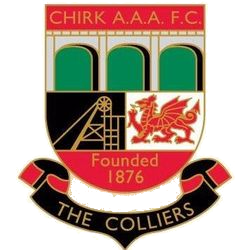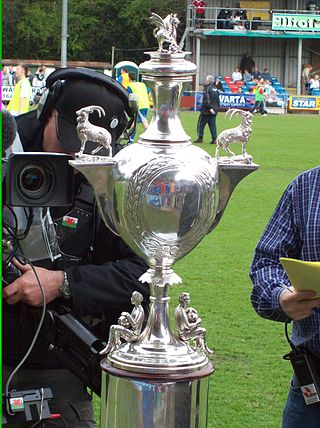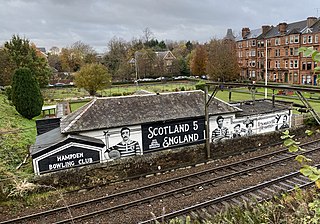
Crewe Alexandra Football Club is a professional association football club based in the town of Crewe, Cheshire, England. The team compete in League Two, the fourth level of the English football league system. Nicknamed 'The Railwaymen' because of the town's links with the rail industry, and also commonly known as 'The Alex', they have played at their current Gresty Road location since 1906. The supporters' fiercest rivalry is with Staffordshire-based side Port Vale.

Hyde Road was a football stadium in West Gorton, Manchester, England. It was home to Manchester City F.C. and their predecessors from its construction in 1887 until 1923, when the club moved to Maine Road. It was named after Hyde Road, a road which begins at the east end of Ardwick Green South in Ardwick and runs east towards Hyde. At the boundary between Gorton and Denton it continues as Manchester Road.
Birmingham St. George's F.C. was a football club based in Smethwick, England. The club started as St George's FC in Aston, before moving to the Cape Hill brewery in 1886 under the name Mitchell St George's.

Gresty Road or the Alexandra Stadium, currently known as the Mornflake Stadium for sponsorship reasons, is a football stadium in Crewe, Cheshire, England. The home ground of Crewe Alexandra, it has an all-seated capacity of 10,153.

The East Melbourne Cricket Ground was a grass oval sports venue located at the southwest corner of Jolimont Road and Jolimont Parade in East Melbourne, Victoria, Australia. The site is best known for playing host to many sporting events during the city of Melbourne's early existence, consisting mainly of cricket and Australian rules football, although the ground occasionally hosted soccer matches. Its closure was predicated by the annexure of the land by Victoria Railways to enable stabling and marshalling of trains as part of the electrification of Melbourne's metropolitan rail service.
The 1887–88 British Home Championship was the fifth edition of the annual international football tournament played between the British Home Nations. It was the first edition of the tournament in which Scotland did not at least share in the trophy and was also notable for a record flood of goals, 46 in six games, 26 of them conceded by Ireland, who suffered a disastrous competition.
The Crewe Kings was a British Speedway team which operated in Crewe, Cheshire from 1969 until its closure in 1975.

Chirk AAA F.C. is a Welsh football team based in Chirk, Wales. They compete in the Cymru North. They were previously in the Premier division of the Welsh National League since their relegation after one season in the Cymru Alliance. Chirk is the only former Welsh Cup winner who to date have not competed in the Cymru Premier of today.
Swifts Football Club were a football team based in Slough, England.
Witton Football Club was a football club from Blackburn in Lancashire.
Geoffrey Hunter was an English footballer who played as a midfielder. In a twelve-year career in the Football League he played 507 league and cup games, scoring 40 goals.

The 1888–89 FAW Welsh Cup was the 12th edition of the annual knockout tournament for competitive football teams in Wales. The competition was won by Bangor.

The 1886–87 FAW Welsh Cup was the tenth edition of the annual knockout tournament for competitive football teams in Wales.
Halliwell F.C. was an English association football club based in Halliwell, in north-west Bolton.
Davenham F.C. was an English association football club, from Davenham, Cheshire.

Hampden Park was a football ground in Crosshill, Renfrewshire. The home ground of Queen's Park from 1873 until 1883, it was the first of three stadiums to bear the same name, and hosted the first-ever Scottish Cup final in 1874.
Ibrox Park was a football ground in Ibrox, Scotland. It was the home ground of Rangers from 1887 until they moved to the adjacent second Ibrox in 1899. The ground staged the Scottish Cup Final four times and also three Scotland international matches.
Kinning Park was a 19th-century sports ground in Kinning Park, Renfrewshire, Scotland, primarily used for cricket and football. It was the home of Clydesdale Cricket Club from 1849, staging a number of important matches against visiting English teams. It was also the original home of the club's football team, Clydesdale F.C. When both teams relocated to Titwood in 1876, Kinning Park was taken over by Rangers F.C., who played there until moving to the first Ibrox Park in 1887. The ground was the venue for the 1881 Scottish Cup Final between Queen's Park and Dumbarton.
Darwen Old Wanderers F.C. was an English association football club from the town of Darwen in Lancashire.
Hartford St John's Football Club was an English football club from the village of Hartford in Cheshire.









